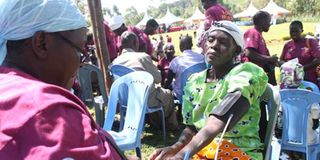Community health workers are key, but remain unpaid

A community Health Worker takes a blood pressure reading in Rachuonyo, Homa Bay County. They are the first point of call for many ill patients in rural areas. PHOTO | FILE
What you need to know:
- Community health workers are seen as key in reducing maternal mortality and child mortality rates by ensuring pregnant women attend clinics and give birth in hospitals and take their children for immunisation and treatment for pneumonia and malaria, the number one cause of death for children under age five.
- According to World Health Organisation, CHWs are often the first responders to humanitarian crises often with little access to resources and frequently at great personal risk during epidemics, natural disasters and armed conflict.
- In Siaya where CHWs get a stipend, the County Executive Committee member for health, Dr Olang’o Onudi, says that since 2014 when the county started working in tandem with the CHWs, there has been a four per cent drop in under-five deaths and deaths from preventable communicable diseases.
When Alice Owako received a distress call from a woman whose child was convulsing in Sega Village in Siaya County, she jumped onto her bicycle and rode to the rescue for three hours on a bumpy road. The child had been treated for malaria with herbs for a week with no signs of improvement. It was only when she started convulsing that the mother called Ms Owako, a community health worker, for assistance.
“The child later tested HIV-positive, but because she had been delivered at home and not taken for immunisation, her mother was not aware of this status,” says Ms Owako, who called in an ambulance to transfer the baby to Sega Mission Hospital for specialised care.
Community health workers (CHWs) are members of a local community who are chosen to provide basic healthcare and to promote healthy practices and illness prevention. However, despite the crucial service they provide in rural communities with limited access to healthcare or in places where reliance on traditional healers and birth attendants is the norm, community health workers remain unpaid for their service.
In Siaya, where they are known as Nyamrerwa, they get a stipend of Sh3, 000. They also get a phone for data collection. Ms Owako was trained by the Red Cross in 2003 and given a bicycle to help her move around. She visits 160 people a month and works with 16 other CHWs attached to the Sega Community Unit, and 2,000 CHWs attached to Siaya County, providing a broad range of health services.
IMPROVED OUTCOMES
Community health workers are seen as key in reducing maternal mortality and child mortality rates by ensuring pregnant women attend clinics and give birth in hospitals and take their children for immunisation and treatment for pneumonia and malaria, the number one cause of death for children under age five. They are also key in HIV and tuberculosis treatment and prevention.
While the Kisumu County Assembly debated a motion earlier this year, to pay CHWs Sh5, 000 for their work, the motion did not see light of day. This meant that CHWs like Alice Odhiambo who is attached to the Ojola Unit in Kisumu, do not get to provide timely help to members of the community, especially due to lack of transport.
In Siaya where CHWs get a stipend, the County Executive Committee member for health, Dr Olang’o Onudi, says that since 2014 when the county started working in tandem with the CHWs, there has been a four per cent drop in under-five deaths and deaths from preventable communicable diseases. There has also been an increase in women giving birth in hospitals from 45 per cent in 2011, to the current 62 per cent.
Ms Owako and team meet every month to deliver reports to their supervisors. The county uses their data to plan and make projections. In March this year at the Africa Health Agenda International Conference in Nairobi, health delegates rolled out a campaign to have CHWs paid and incorporated into the healthcare system.
According to World Health Organisation, CHWs are often the first responders to humanitarian crises often with little access to resources and frequently at great personal risk during epidemics, natural disasters and armed conflict. In West Africa, 875 community health workers were infected with Ebola during the most recent outbreak, and more than half died, according to WHO.
“Community health workers need stable salaries. They are doing too much work yet they are not appreciated,” said Dr Matshidiso Moeti, the Director WHO Africa Regional Office.
In Africa, only Nigeria, Malawi, Rwanda Ethiopia and South Africa have programmes that acknowledge the work of CHWs and offer them a career beyond community work.
The Kenyan government, a signatory of ‘1 million community health workers’ campaign which recognises the existence of CHWs and underlines their importance of primary healthcare, is, however, yet to show commitment towards that end.



